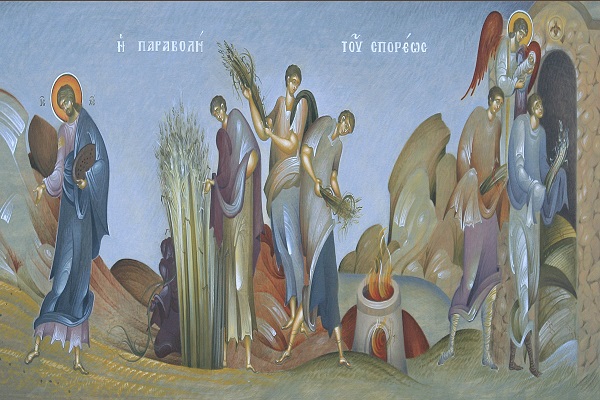The Word of God (Luke 8, 5-15)
18 October 2021‘The Seed is the Word of God’
Very often the Lord would speak in similes and parables. One of his most important parables is that of the sower, the subject of today’s Gospel reading. A farmer was sowing his seed in a field, and, of the four portions, three fell on the road, on rocks or among thorns. The remaining portion fell on good ground and brought forth fruit: in one place thirtyfold, in another sixtyfold and in another one hundredfold (Mark 4, 20). Let’s see how the word of God bears fruit.

The interpretation of the parable. The Lord explained the parable and said that the good ground is those who have good and pure hearts (Luke 8, 15); they’re people who understand (Matth. 13, 19); they’re those who have paid serious attention to the word of God; they’re receptive (Mark 4, 20). None of these reject the word of God but cultivate the seed of God with great patience and persistence, which is why they bore so much fruit. What is this fruit? The word of Christ is God himself. It’s not merely human discourse in which is hidden a religious message, even if it’s the greatest and most stunning of messages. Behind the words of the Gospel stands Christ himself, the Son of God, his Word. ‘My children, in whom I am again in labor until Christ is formed in you’ (Gal. 4, 19), as Saint Paul puts it. Like a small infant, Christ, the Word of God, really does grow in our hearts. Moreover, Jesus himself says that his mother and siblings are those who hear the word of God and apply it in their lives (Luke 8, 21). If we observe the words and commandments of God, this is the most incontrovertible testimony to the fact that Christ has been formed within us.
How should we understand the yield of the Word of God?
Saint Symeon the New Theologian makes the following comparison: if a woman is carrying a baby, there may be no external sign of her pregnancy, or, at least, other people might not suspect that she’s bearing a child in her womb. She, on the other hand, feels the baby moving and is absolutely certain that she’s with child. This is also true of people who have accepted the word of God: they understand very well that they have the nourishing seed of God within them.
Let’s give a few examples. Take someone who, before they believed in Christ was selfish, jealous, immoral and self-centered. Once they’ve accepted the seeds of the message, however, they begin to be open to people other than themselves. They now begin to resist sins which formerly they considered insignificant. They start to give alms and to make a serious effort, with the help of the sacraments of the Church, to retain within themselves the light and grace of Christ. They change radically and in a wonderful manner. This is the fruit of the divine seed. The complete bounty is to see God ‘as he is’ (1 Jn. 3, 2).
In his letter to the Hebrews, Saint Paul makes mention of those who have tasted the goodness of the word of God (6, 5). He doesn’t say ‘those who have heard’, but ‘those who have tasted’, those who have tested Christ. Those who partake- ‘with fear of God, faith and love’- in the body and blood of the Lord, taste and feel within themselves the joy and presence of the Holy Spirit. Those who hear the Gospel, the ‘Good News’, have a profound sense of the presence of God in their life. Those who cultivate the word of God are saved. To sum up, we can say that fruition is the words of eternal life, is the proclamation of immortality, the promise of a life renewed, the Gospel of the Kingdom of God, the sense of paradise, the face of Christ and spiritual life. The Church sows the word of God. The Church opens the way to the faithful for Christ to enter us. It preaches Jesus Christ crucified and resurrected, at a time when the sinful world is sending other messages. In our belligerent and sinful age, the Church encourages us to listen to the word of God and to repent: ‘Repent, then, and return, so that your sins may be expunged’ (Acts, 3, 19). People nowadays have become accustomed to hearing the weirdest words: immoral, malicious, avaricious, selfish and anti-Christian. The word of God, which is simple and concise, is addressed to all of us and calls upon us to bear Christ within us. Let’s not neglect the word of our Lord, but let’s show patience and give our all in order to increase it as much as possible, and thus be saved.






